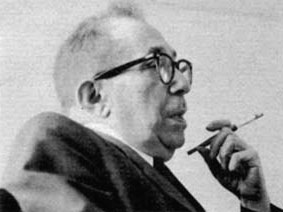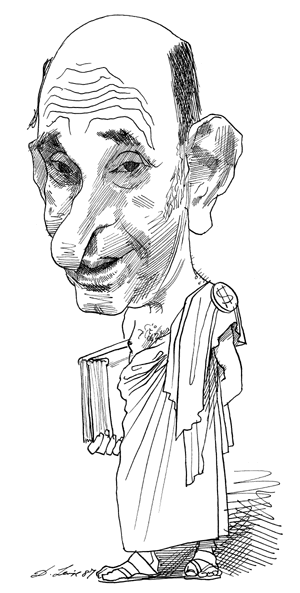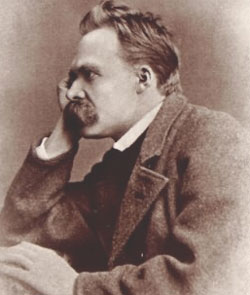
JUNE 2004
If truth is the real mind Who would claim one man’s burlesque Solitary Oracle of power Wrenching bones From dust To flood dust with blood ? May the scholar be trembling ... The skull of the lion, Carved, Rests in the lintel One step taken... To the passage of the
arch. Alone and silent A stone flower Throws out tendrils.... At the entrance, my palm Slips into the stone pocket, The handrest for fourteen hundred years. I may leave a message there For you. |
Until quite recently, Leo
Strauss and his disciples were  considered (insofar as anyone took any
notice of them) just a particular variety of conservative
intellectuals, with a special interest in political
philosophy and American constitutional history. Now we
are beginning to discover that something peculiar has
been going on all this time.
considered (insofar as anyone took any
notice of them) just a particular variety of conservative
intellectuals, with a special interest in political
philosophy and American constitutional history. Now we
are beginning to discover that something peculiar has
been going on all this time.
Not a single other "conservative" thinker has inspired a following remotely comparable, in size, continuity, and influence, to that of Leo Strauss. There is a Straussian school. And this school has its own interests, ideas, and purposes, which are clearly distinct from mainstream conservatism, however close to their collective chest they play their cards.
The Straussians are also the only group of "conservatives" ever to amount to anything in the academic world. They have reportedly been gradually, quietly infiltrating and taking over political-science departments, making that discipline characteristically theirs, as Marxists have done with sociology, and libertarians with economics.
Then along came Allan
Bloom, who was catapulted to  momentary fame by "The
Closing of the American Mind "(1987), briefly
becoming one of the most publicly-recognized
"conservative" figures ... second only to
William F. Buckley, Jr., who had spent decades making his
name as the liberal establishment's token conservative.
Curiously (and characteristically) enough, in Bloom's
famous (or infamous) book, he only mentions his master
once, and in passing, so that the vast majority of his
readers remained blissfully ignorant of any connection
(probably never having heard of Leo Strauss anyway); yet
those in the know could immediately recognize Bloom's
intellectual affiliation.
momentary fame by "The
Closing of the American Mind "(1987), briefly
becoming one of the most publicly-recognized
"conservative" figures ... second only to
William F. Buckley, Jr., who had spent decades making his
name as the liberal establishment's token conservative.
Curiously (and characteristically) enough, in Bloom's
famous (or infamous) book, he only mentions his master
once, and in passing, so that the vast majority of his
readers remained blissfully ignorant of any connection
(probably never having heard of Leo Strauss anyway); yet
those in the know could immediately recognize Bloom's
intellectual affiliation.
Strauss and the Straussians began to attract more attention, both journalistic and scholastic. One liberal scholar, Shadia Drury, has made a career of writing anti-Straussian exposés: The Political Ideas of Leo Strauss (1988), Alexandre Kojeve: the Roots of Postmodern Politics (1994), Leo Strauss and the American Right (1997).
The distinctively Straussian approach to political philosophy is, quite simply, to take premodern philosophers seriously. This is, by itself, a radical challenge to modern historicism (i.e. historical relativism), which holds that the thoughts of premodern philosophers are "outmoded" and irrelevant; they were mental prisoners of their epoch -- usually ignoring the implication that we, too, are mental prisoners of our own epoch, so that contemporary prejudices are no better than "outmoded" ones.
But this is only a prelude to an even more radical challenge to modern thought: the Straussians believe that premodern philosophy is better than modern philosophy. The Straussians are pre-modern and anti-modern, not in the name of religion (like the various forms of religious fundamentalism all over the world) or of tradition (like conservatives since Edmund Burke), but in the name of reason, of philosophy: an understanding of reason and philosophy different from the Enlightenment's.
The teaching of Leo Strauss is "political philosophy" in a very special sense: his primary, if not exclusive, concern is the relation of philosophy (and the philosophers themselves) to society as a whole. Moreover, he imputes this primary concern to the premodern and early modern philosophers.
The lesson of the trial
and execution of Socrates is that Socrates was guilty as
charged: philosophy is a threat to society. By
questioning the gods and the moral of the city,
philosophy undermines the citizens' loyalty, and thus the
basis of normal social life. Yet philosophy is also the
highest of all human endeavors. The resolution of this
conflict is that the philosophers should, and in fact
did, keep their teachings secret, passing them on
by the esoteric art of writing "between the
lines." Strauss believed that he alone had
recovered the true, hidden message contained in the
"Great Tradition" of philosophy from Plato to
Hobbes and Locke: the message that there are no gods,
that morality is ungrounded prejudice, and that society
is not grounded in nature.
With Machiavelli, however, there came a shift in
emphasis. He was the first to deviate from the esoteric
tradition that began with Plato, thereby initiating the
Enlightenment. Machiavelli de-moralized political
philosophy, and thereby created "political
science." Virtue, whether defined in classical or
Christian terms, was dethroned, because no regime could
live up to its demands. Instead, a new regime could
and should be created, by accepting, understanding, and
harnessing men's lower, self-interested nature.
The modern world is held to be the deliberate creation (with some unintended consequences) of the modern philosophers -- which gave birth to both scientific-technological progress and the liberal ideology of social-political progress. They argue (though still covertly) that instead of hiding philosophy, philosophers should reform society to make it more hospitable to philosophy: in particular, by undertaking the "project" of modern science, by which reason masters nature and provides material gratifications -- safety, health and wealth -- to common men, bribing them into acquiescence to philosophy. Physical science and technology would provide the know-how, while a new kind of regime, liberalism, would provide the conditions of liberty and equality enabling men to pursue their self-interest.
The problem with this (in the Straussian view) is that it exposed philosophy once more, and ultimately prostituted philosophy itself into the service of common men. The tradition of secrecy was forgotten, and with it philosophy as such. At the same time, philosophy inadvertently exposed men to certain hard truths, truths too hard for them to bear: that there are no gods to reward good or punish evil; that no one's patria is really any better than anyone else's; that one's ancestral ways are merely conventional. This leads to nihilism, epitomized by the listless, meaningless life of bourgeois man, or to dangerous experiments with new gods -- gods like the race and the Fuehrer.
Strauss, an ethnic Jew and refugee from Nazi Germany, looked at the regnant liberalism of mid-century America, and saw the Weimar Republic: morally weak, incapable of self-preservation. His prophecy was fulfilled by the ignominious collapse of the liberal establishment, both political and academic, in the face of the New Left.
Now, this unique interpretation of Western history depends on the existence of a "hidden agenda" in the history of philosophy. If there was, in fact, such an esoteric tradition, it has escaped the attention of most scholars.
There are several problems with his "teaching." First, is the philosopher (in the original, literal sense: a "lover of wisdom") really a superior type of person? I think that he is -- but not that he is a superior being. The difference between the philosopher and the ordinary person is one of degree, not of kind. His impulses are the same, but ordered differently. No matter how rational he is, he is still a rational animal: a sexual one, for instance, and a social one. His curiosity is more fully developed than theirs, but unless his other faculties are at least as well developed as theirs, this one trait does not make him better than they are.
The ancient philosophers did believe that the philosophic life is the highest and best, but only a few are suited to it. The Straussians agree, and go on to imply that the major evil of modern egalitarianism is that it makes philosophy impossible, by devaluing anything that is not accessible to the common man. But philosophy is not the only thing that suffers: so do creativity, heroism, authority, and all other "elitist" qualities.
Bloom makes much of this. Philosophy is all the less appealing if, as he seems to assume, the ultimate truth is that there is no truth. It is all the more important, then, to convey this truth through misdirection: the desire to know cannot be aroused unless the "allure" of truth is held out.
The main difference between the Straussians and Left-wing nihilists is that the former think the "truth" of value-relativism should be known only to the few. All the philosophical problems with relativism apply to the Straussians' Right-wing version, and in spades. Suffice it here to say that the Straussians, too, have to introduce quasi-objective standards of judgment, covertly and unintentionally: e.g., the social utility of religion and patriotism.
Then there is an evident contradiction between the idea of philosophy as the pursuit of truth, and the idea of philosophy as a body of esoteric lore. If the Straussian reading is correct, it would seem that the history of philosophy consists of practically nothing but pondering the relation of philosophy to civil society, rather than pondering philosophical questions themselves. All the important questions have already been answered, or declared to be unanswerable: this is what created the tension between philosophy and civil society in the first place. So what is there for philosophers to do? The Straussians themselves are not even philosophers, but historians of philosophy, custodians of the secret lore.
The perceived need to write obscurely also tends to obscure thought. "The Closing of the American Mind "is much better-written (in style, at least, if not in convoluted structure and argumentation) than anything by Leo Strauss. But even Bloom makes his argument complex and subtle to the point of evasiveness, as if he wants to confuse and mislead the reader. (In particular, his critics -- those who actually did read him -- were hardly ever able to tell when he was or was not speaking in propria persona.) Bloom, at least, writes so well that he charms rather than repulses the reader, so one is (if sympathetic) willing to read his book again and again, with closer and closer attention; but not even the most sympathetic reader can really be sure, in the end, precisely what Bloom really means, behind all the good and important things he does say.
Bloom's analysis of our cultural predicament is so true, so profound, that there must be some truth in his speculations as to its causes; but he all-too-carefully avoids making clear and specific claims that can be put to the test. This is the great weakness of the Straussian method: so careful is he to hide the point of his argument, he nearly fails to make it. Certainly he fails to support it. Strauss puts his students to such a mental effort to try to understand him that they are too exhausted to make the mental effort to criticize him.
Given the inherent obscurity of the Straussian teaching, one should only be surprised if it did not produce conflicting interpretations. There are in fact two schools of Straussians: those like Bloom, who accept and propound this esoteric teaching; and those, such as Harry Jaffa, who interpret Strauss in terms of a more conventional understanding of classical philosophy. One might call them the esoterics and the exoterics, but it is hard to tell which is which.
Both of them challenge the prevailing relativism of twentieth-century thought, harking back to classical standards of truth and justice; but the Straussians only do so because truth and justice are salutary myths, while the others (perhaps) really do believe in truth and justice.
The two schools are also divided on their interpretation of American history, and particularly the American Founding. Both follow Strauss's division of philosophical history into the (good) "ancients" and the (bad) "moderns." According to the esoteric version, America was wholly modern from its inception: it is entirely the creation of the "modern project."
The Strauss scholars,
then, basically agree with the (pre-1960s) liberal
understanding of American history: we are a
"proposition nation," liberal to the core, and
conservatism is un-American. The cult of the Founding
Fathers is just a salutary myth.
The truth is that the Founders, under the tutelage of
Hobbes and Locke, deliberately created a squalid regime
ruled by self-interest, sacrificing virtue to liberty and
equality, and are ultimately responsible for the
philistinism, mediocrity, and deracination of
contemporary America.
Straussianism is an extraordinarily complex and subtle body of ideas, and I am sure that I have hardly done it justice in this small space. But in the end, Straussianism offers more questions than answers.
© 2000 by Karl Jahn
Home Posted by: tgif at May 14, 2004
| QUOTE FROM ALAN BLOOM"Freedom of the mind requires not only, or not even especially, the absence of legal constraints but the presence of alternative thoughts. The most successful tyranny is not the one that uses force to assure uniformity, but the one that removes awareness of other possibilities." |
A salutary view of
the philosophical views of Deleuze and Guattari now
becomes essential!!
See a recent essay by Irving Goh in C-theory on-line ctheory@lista.uvic.ca .
Analysis of "A Thousand Plateaus" by
the philosophers Deleuze and Guattari, confined to the
chapter "Nomadology"re. theory of a thought
projectile, such as the Nomadic War-Machine.
Goh determines that this philosophic theory must be
allowed to hold a space within all social and academic
discourse. "Philosophy has not yet been interrogated
of its risk or apparent threat....What could a text of philosophy, in
itself a mere philosophical argument do?......the
question of the right of philosophy and the the right to
philosophy by politics remains..an approaching eclipse
given the political climate of the present time."
He observes: "Only
by risking being a threat to a dominating and
homogenizing political discourse, risking a war with the
State, ...will philosophy think anew an armature of
counter-thoughts to resist any monolithic thought and its
contemporary modifications that seek to veil its
nonetheless fascistic determination."
Also:"From the point of view of the State, it is
best that no thought deviates from the dominant one....
it is even better that the political, economic and
techno-scientific "progress" of the State be
left unthought by the citizens of the State, and left
archived by the State, history, as its grand narrative.
.... and consequently, by an apparent appeal to the mass
consensus, it is able to outlaw any form of
counter-thought and fragment the community by separating
those with deviant thought trajectories....... rigorously
evident today, the State war against terror of the U.S.
takes itself to be the de jure international force of Law
against terrorism...with the rights to categorize other
States EITHER as supporters of anti-terrorism OR
sympathisers of terrorists, and thus given all Rights to
conduct military violence in its own terms against the
latter."
Deleuze and Guattari posit a nomad war-machine as that
"which resists and which escapes the capture of a
fixed point of view..... it brings a "furor to bear
against sovereignty"... It projects the full force
of a war-machine against the State only because the task
of thinking has to be seriously brought back to a
plurality and heterogeniety of thought, which is but the
right of a plural and heterogenous people."
This is a very important
Essay, it clarifies what is thought to be the
unapproachable complexity of the volume in hand , "A
Thousand Plateaus", and in this one special respect
of Freedom of Thought that is now under threat and
of the utmost concern at the present time under the
present conditions of political tyranny which is emerging
in the U.S.Republican Government hog tied by the pupils
and scholars of Leo Strauss.
J.Braddell, editor.
 Leo
Strauss and Nietzsche
Leo
Strauss and Nietzsche great tradition of political philosophy
stretching back to Plato. Among Strauss's most
enduring legacies is a strongly negative
assessment of Nietzsche as the modern philosopher
most at odds with that tradition and most
responsible for the sins of twentieth-century
culture--relativism, godlessness, nihilism, and
the breakdown of family values. BUT, in fact,
this apparent denunciation has become so closely
associated with Strauss that it is often seen as
the very core of his thought.
great tradition of political philosophy
stretching back to Plato. Among Strauss's most
enduring legacies is a strongly negative
assessment of Nietzsche as the modern philosopher
most at odds with that tradition and most
responsible for the sins of twentieth-century
culture--relativism, godlessness, nihilism, and
the breakdown of family values. BUT, in fact,
this apparent denunciation has become so closely
associated with Strauss that it is often seen as
the very core of his thought.